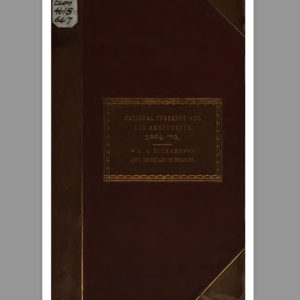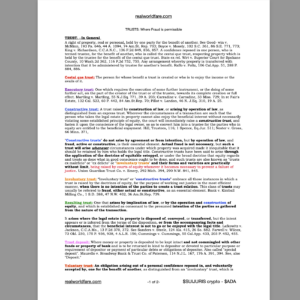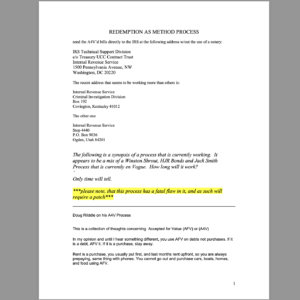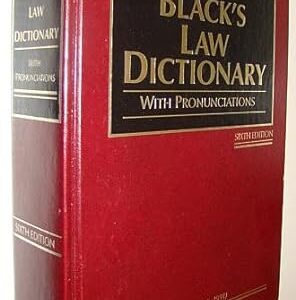Black’s Law Dictionary 1st Edition, pages 585-586:
HYPOTHECATION. A term borrowed from the civil law. In so far as it is naturalized in English an American law, it mans a contract of mortgage or pledge in which the subject-matter is not delivered into the possession of the pledgee or pawnee; or, conversely, a conventional right existing in one person over specific property of another, which consists in the power to cause a sale of the same, though it be not in his possession, in order that a specific claim o the creditor may be satisfied out of the proceeds.
The term is frequently used in our text books and reports, particularly upon the law of bottomry and maritime liens; thus a vessel is said to be hypothecated for the demand of one who has advanced money for supplies.
In the common law, there are but few, if any, cases of hypothecation, in the strict sense of the civil law; that is, a pledge without possession by the pledgee. The nearest approaches, perhaps, are cases of bottomry bonds and claims of materialsmen, and of seamen for wages; but these are liens and privileges, ratherthan hypothecations. Story, Cailm. § 288.
“Hypothecation” is a term of the civil law, and is that kind of pledge in which the possession of the thing pledged remains with the debtor, (the obligation resting in mere contract without delivery;) and in this respect distinguished from “pignus,” in which possession is delivered to the creditor or pawnee. 24Ark. 27. See 2 Bell, Comm. 25.
Black’s Law Dictionary 2nd Edition, pages 585:
HYPOTHECATION. A term borrowed from the civil law. In so far as it is naturalized in English an American law, it mans a contract of mortgage or pledge in which the subject-matter is not delivered into the possession of the pledgee or pawnee; or, conversely, a conventional right existing in one person over specific property of another, which consists in the power to cause a sale of the same, though it be not in his possession, in order that a specific claim o the creditor may be satisfied out of the proceeds.
The term is frequently used in our text books and reports, particularly upon the law of bottomry and maritime liens; thus a vessel is said to be hypothecated for the demand of one who has advanced money for supplies.
In the common law, there are but few, if any, cases of hypothecation, in the strict sense of the civil law; that is, a pledge without possession by the pledgee. The nearest approaches, perhaps, are cases of bottomry bonds and claims of materialsmen, and of seamen for wages; but these are liens and privileges, ratherthan hypothecations. Story, Cailm. § 288.
“Hypothecation” is a term of the civil law, and is that kind of pledge in which the possession of the thing pledged remains with the debtor, (the obligation resting in mere contract without delivery;) and in this respect distinguished from “pignus,” in which possession is delivered to the creditor or pawnee. 24Ark. 27. See 2 Bell, Comm. 25.
Black’s Law Dictionary 3rd Edition, pages 911-912:
HYPOTHECATION. A term borrowed from the civil law. In so far as it is naturalized in English an American law, it mans a contract of mortgage or pledge in which the subject-matter is not delivered into the possession of the pledgee or pawnee; or, conversely, a conventional right existing in one person over specific property of another, which consists in the power to cause a sale of the same, though it be not in his possession, in order that a specific claim o the creditor may be satisfied out of the proceeds.
The term is frequently used in our text books and reports, particularly upon the law of bottomry and maritime liens; thus a vessel is said to be hypothecated for the demand of one who has advanced money for supplies.
In the common law, there are but few, if any, cases of hypothecation, in the strict sense of the civil law; that is, a pledge without possession by the pledgee. The nearest approaches, perhaps, are cases of bottomry bonds and claims of materialsmen, and of seamen for wages; but these are liens and privileges, ratherthan hypothecations. Story, Cailm. § 288.
“Hypothecation” is a term of the civil law, and is that kind of pledge in which the possession of the thing pledged remains with the debtor, (the obligation resting in mere contract without delivery;) and in this respect distinguished from “pignus,” in which possession is delivered to the creditor or pawnee. 24Ark. 27. See 2 Bell, Comm. 25.
Black’s Law Dictionary 4th Edition, pages 877:
HYPOTHECATION. The term borrowed from the civil law. In so far as it is naturalized in English and American law, it means a contract of mort- gage or pledge in which the subject-matter is not delivered into the possession of the pledgee or pawnee; or, conversely, a conventional right ex- isting in one person over specific property of an- other, which consists in the power to cause a sale of the same, though it be not in his possession, in order that a specific claim of the creditor may be satisfied out of the proceeds. Whitney v. Peay, 24 Ark. 27.
The term is frequently used in our textbooks and reports, particularly upon the law of bottomry and maritime liens; thus a vessel is said to be hypothecated for the demand of one who has advanced money for supplies.
In the common law, there are but few, if any, cases of hypothecation, in the strict sense of the civil law; that is, a pledge without possession by the pledgee. The nearest approaches, perhaps, are cases of bottomry bonds and claims of materialmen, and of seamen for wages; but these are liens and privileges, rather than hypothecations: Story, Bailm. § 288.
Black’s Law Dictionary 7th Edition, pages 747:
hypothecation (hI-poth-a-kay-shan) , n. The pledging of something as security without deliv ery of title or possession. – hypothecator (hI poth-a-kay-tar), n.
tacit hypothecation. 1. Civil law. A type of lien or mortgage that is created by operation of law and without the parties’ express agree ment. – Also termed tacit mortgage. 2. See maritime lien under LIEN.
Black’s Law Dictionary 8th Edition, pages 2172:
hypothecation (hI-poth-<<schwa>>-kay-sh<<schwa>>n), n. The pledging of something as security without delivery of title or possession. [Cases: Pledges 1–21; Secured Transactions 1. C.J.S. Pledges §§ 2–21, 27; Secured Transactions§§ 3, 7–9, 23, 37.] — hypothecator (hI-poth-<<schwa>>-kay-t<<schwa>>r), n.
general hypothecation. 1. A debtor’s pledge to allow all the property named in the security instrument to serve as collateral and to be used to satisfy the outstanding debt. 2. See tacit hypothecation (1), (2).
tacit hypothecation. 1.Civil law. A type of lien or mortgage that is created by operation of law and without the parties’ express agreement. — Also termed tacit mortgage. 2. See maritime lien under LIEN.












Recent Comments